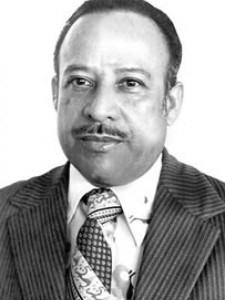Rector Martyr of the University of El Salvador
President of WUS International 1980

My father, Engineer Félix Ulloa, was killed in a machine-gun attack by a death squad on 28 October 1980, a few steps away from the University of El Salvador, UES, campus. He was due days later to travel to Geneva, Switzerland to chair a World University Service-International (WUS) meeting. His assassination became a symbol of the state repression of the education and cultural sectors in El Salvador that would continue for another decade.
Months before he had been elected international president of WUS at the meeting of this organisation in Managua, Nicaragua. For the people of El Salvador, his election was a significant symbol of solidarity with the whole education sector and highlighted the repression that it had historically suffered. Sadly, not even this international recognition was a protection but may well have made him even more of a target for the dictatorial regime that ruled the country those days.
At the time of his assassination, Rector Ulloa also held the position of vice-president of the Inter national Association of Universities, having been elected in the 25-30 August 1980 meeting in Manila, Philippines, just days before his assassination.
Taking advantage of his trip to the WUS meeting, he planned to visit Germany, where he had been awarded with the Alternative Peace Prize by the academic community there.
Legacy to the Salvadoran university community

My father’s sacrifice was not in vain. His legacy to the Salvadoran university community has been immortalised in his famous phrase “The University of El Salvador refuses to die”, which was an allusion to the earlier attack on the University of Salamanca, by the fascists in Spain and the response of then Rector Miguel Unamuno.
It was the key theme in his speech to reopen UES activities, outside its campus which had been violently occupied by the military on June 26, 1980. Numerous students were killed, libraries burned and laboratories with their equipment destroyed. This turned out to become the longest military occupation in its history and resulted in the looting of its heritage and set back by years the tasks of teaching, research and social outreach, which characterised it since its foundation in 1841.
My father and his role in 1979 to 1980 continued the long tradition of the identification of the UES with the efforts over decades of the Salvadorian people to overcome military dictatorships and underdevelopment, establishing a rule of law, based on social justice and democratic principles.
His distinguished academic record and beyond His outstanding academic record was widely recognised. He obtained a master’s degree in Industrial Engineering at the Technological Institute of Atlanta, Georgia, USA, the well-known Georgia Tech, in 1967/68, and led to him becoming the head of the newly created School of Industrial Engineering at the UES. He was later elected Dean of the Faculty of Engineering and Architecture of the UES in 1970.
Beyond the academic, he felt a great responsibility as the head of El Salvador’s main institution of learning at the time that the brutal and protracted civil war was beginning. Recently, the Salvadorian university “Andrés Bello” published a book with more than 200 poems by Rector Ulloa, written in his youth, when he was working as a rural teacher in the surroundings of his beloved hometown of Chinameca. One can see in these poems the literary influences of the time, especially the romanticism of Rubén Darío, manifested in profound metaphors, sonnets, free verse and phrases that, written neatly and with an astonishingly rich lexicon, provide an insight into a largely unknown facet of the rector and his place in Salvadoran literature.
A lasting tribute initiated by WUS (UK) In his memory
John Bevan, then co-general secretary of WUS UK created in the UK the Friends of the University of El Salvador. For several years we campaigned on the issues of my father’s assassination, the violent repression of students and faculty and the prolonged occupation of the University, he in Europe and me in Mexico, Canada and the US. We did this in parallel in a different age lacking connectivity and were never directly in contact till some quarter of a century later when we met in Haiti when John was the UN political head of the mission known as MINUSTAH, and I was leading the National Democratic Institute’s work on elections and democracy building. It says a lot for WUS and its work in the turbulent 1980s that it promoted such co-operation, solidarity and friendships.
By paying this tribute, on the significant 100th anniversary of WUS, we want through it, to pay a deserved tribute to all Salvadoran university students and those in education throughout the world, who have suffered repression for their ideas, for their way of thinking, for their belonging to the university community, and together with the Rector Martyr of the UES, Eng. Félix Ulloa, we repeat his most famous phrase:
“Blessed are the peoples who remember their dead, because they will live forever.”
Félix Ulloa (jr.) is the son of the assassinated Rector. He was Professor of Political Science at the University of El Salvador, a founder and President of the Institute of Legal Studies of El Salvador, IEJES, that promoted the construction of the Rule of Law, for the defence of democratic freedoms and social justice. Throughout his career he has been a human rights defender, while more recently has had a prominent role in promoting democracy in different countries working with international bodies including NDI, UN, and the OAS. Today Félix Ulloa is the Vice President of El Salvador.
